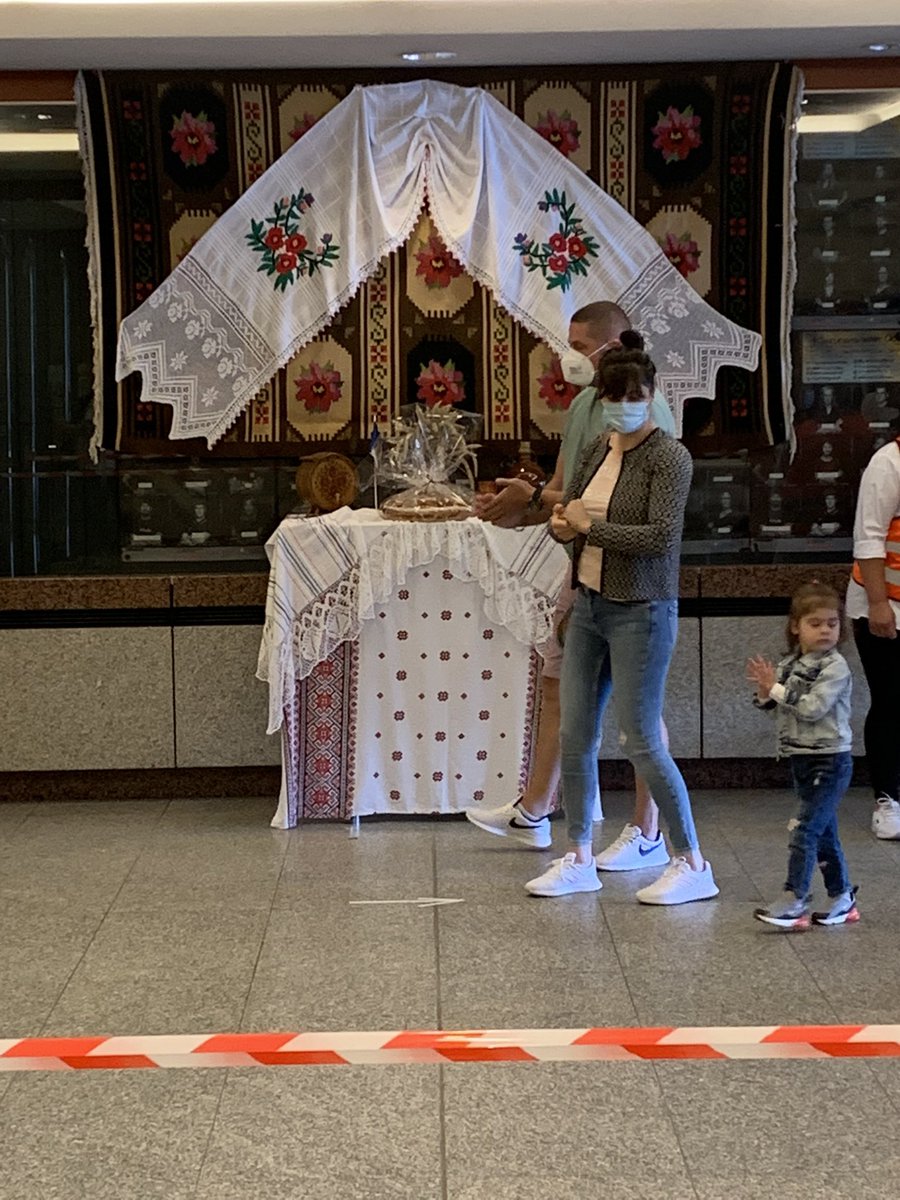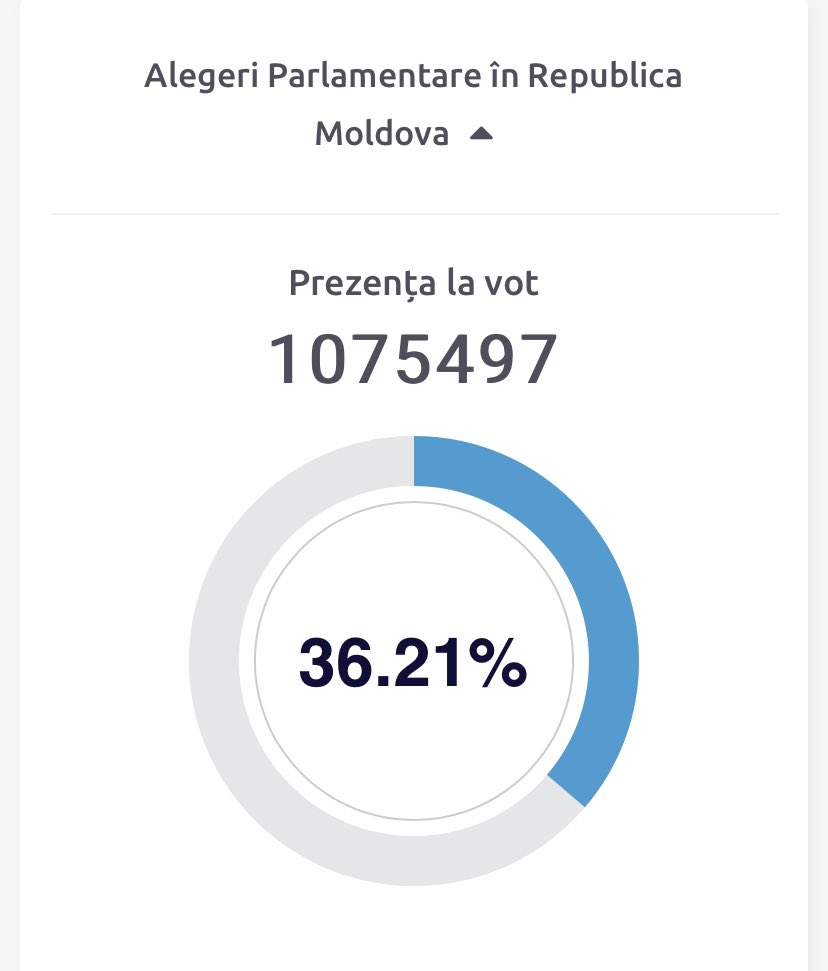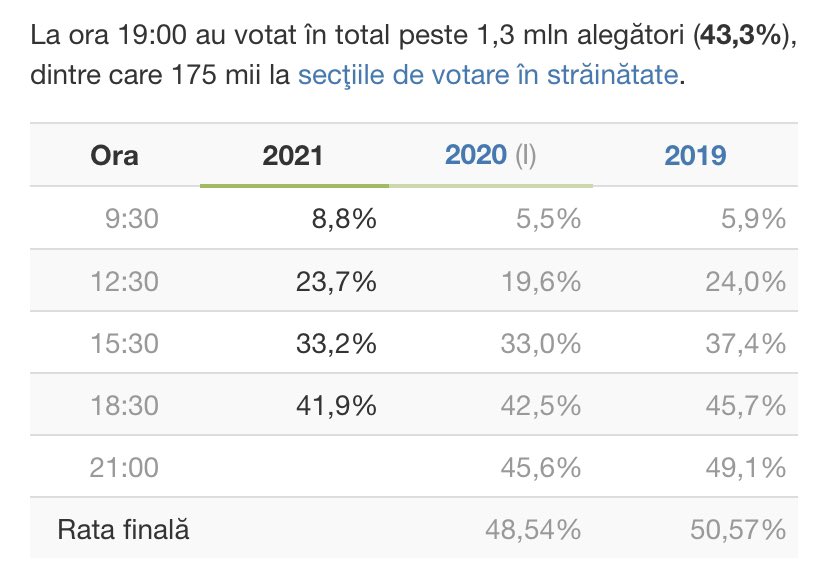#MoldovaVote2021: This thread will cover today's snap elections. In short, there are 23 electoral competitors. The electoral authorities have cast ~ 3.2 million votes, of which ~ 750,000 votes were sent abroad for the diaspora (150 voting sections). Let us begin: ⤵️
1) So far, 10% or approx 285,000 voters have cast their votes. As always, the elderly population is an early riser and voted in greater numbers. 👇 



2) Voters in Germany and Italy, where there is a high concentration of Moldovan and diaspora immigrants, line up to vote.
3) Voters in the breakaway region are lining up at some sanctions. Some 30,000 voted in the second round of the 2020 presidential elections. Overall, there are 41 polling stations open in the controlled territory of the country for these voters.
4) Below is a table on the participation dynamic provided by ADEPT (specialized think-tank from a moldova) based on data from the electoral authority. It can be seen that turnout in these elections seems to be higher in the first half of the day.👇 

5) Competitors have spent around 1.8 million euros. 4 parties each spent between 5 and 13 million MDL (€ 233k-500k): the Renato Usatii Block (“wild card”); PAS (President Sandu’s party); Communist-socialist tandem (the pro-Russian basis); Shor Party (fugitive oligarch’s party).
6) The main political leaders have voted. These elections are about the battle of "yellow" (President Sandu/PAS) against "red" (the Bloc of Communists and Socialists.
7) The electoral process continues. Meanwhile, my brother sent me the screenshot of my intervention for @VOANews (from my office at the university) about the elections. 

8) Half a million have voted so far. The improvement in the epidemiological situation (less than 100 cases for weeks), on the one hand, but also a very active electoral campaign, on the other, favors high participation. By my estimates it should reach at least 55%. Let's see. 

9) One of the “wild cards” of these elections, Renato Usatii, has voted in Germany (Munich) along with the diaspora. He is expected to enter parliament with 5-10% of the total votes.
10) The voting stations abroad where the risk of running out of ballots (5k per section) is high are the following: Mentreuil (1.5k already voted); Bologna (1.6 k); Parma (1.6 k). Other voting stations in the UK, Italy and Germany run the same risk, though to a lesser extent.
11) The diaspora is so important that Moldovan politicians travel abroad to vote in the electoral stations opened for the diaspora. After Renato Usatii, who voted in Munchen, one of the leaders of the right-wing AUR party, former mayor Dorin Chirtoaca, traveled to Frankfurt.
12) I am at the polling station in Frankfurt. Loud music. Nobody wears a mask (outside). Nothing comparable to the stress I experienced last year during the presidential election. 

13) Very well organized voting this year (@MoldovaMFA). It took less than 5 min. to vote. In 2020, I queued for > 2 hours. Some trained singers entertain the voters. More people are coming. Young families with children, etc. I’m leaving to continue monitoring the elections.
14) There are almost 6 hours until the end of the voting day (8:00 p.m.) and 7 hours abroad (9:00 p.m.). So far, 30% have showed up to vote. 

15) By the way, an interesting observation is that at the polling station voters were able to take a photo with this very traditional background. Only the orthodox Christian icon is missing (the use of religious symbols at the electoral stations is prohibited by law). 

16) Turnout seems to stabilize at the level of the 2019 legislative elections. At that time, 50% of registered voters cast their vote. 

17) Local observers have reported repeated cases of alleged bribery of voters from the breakaway region, along with organized transportation. President Sandu's party indicated to the pro-Russian bloc of Communists and Socialists. The latter rejected all the accusations.
18) President Sandu made critical comments towards the electoral authorities, probably referring to the alleged irregularities related to voters in the Transnistrian region (See point 17). She asked them to ensure correct elections or they will be sanctioned later (how?!).
19) Moldovans have 4 more hours to vote and only 36% voted. This is less than in 2019. My previous estimate that the overall share will reach 55% after all makes quite uncertain. A more realistic goal should be 50%. The reasons for the slowdown in participation are unknown. 



20) In less than 1 hour, the voting stations in Moldova will close & the turnout is worrying. Everyone, I say this knowingly, everyone expected a great mobilization. President Sandu asked the people to vote, the pro-Russian forces did too. But clearly this didn't really work. 

22) The vote abroad exceeded the psychological barrier of 200,000. But there are ~ 60k to go to repeat the results of the second round of the 2020 presidential elections. 

23) Exit polls (by telephone) show that President Sandu's PAS party would win the elections with 55%. More information on the final results will be available soon.
24) Important details about the exit poll (by phone): 32% refused to answer! Certainly, President Sandu’s party won the elections, what we do not know for sure is whether or not it can govern alone. 

25) It’s an important element. About an hour before the end of the vote, President Sandu used her Facebook platform (268k followers), asking people to convince their friends and relatives to go vote. This happened while many wondered about the slowdown in participation.
26) 67% of votes counted: President Sandu / PAS - 46.8%; Communists and Socialists - 30%; Shor Party - 7.3%.
30) Apart from President Sandu’s party, another sort of winner is the Party of the Communists that returns into the big politics after many years of absence. Many interesting developments will unfold after these snap elections.
32) President Sandu's party will hold at least 61 of the 101 seats in the newly elected parliament. Source: ADEPT/E-democracy.md 

33) Here is everything you should know about the outcome. It was a long day and night for me. 👇
https://twitter.com/dioniscenusa/status/1414499732618153984
• • •
Missing some Tweet in this thread? You can try to
force a refresh









